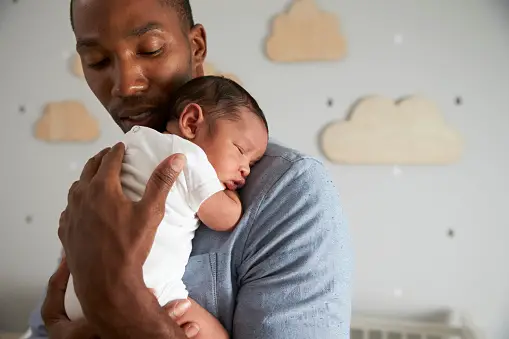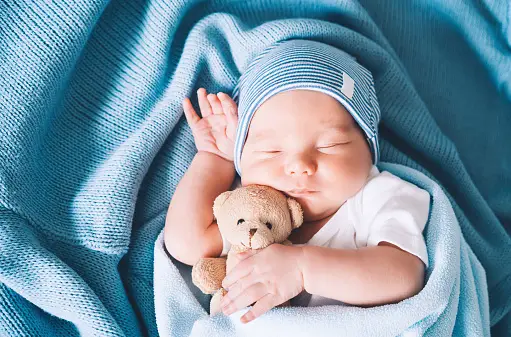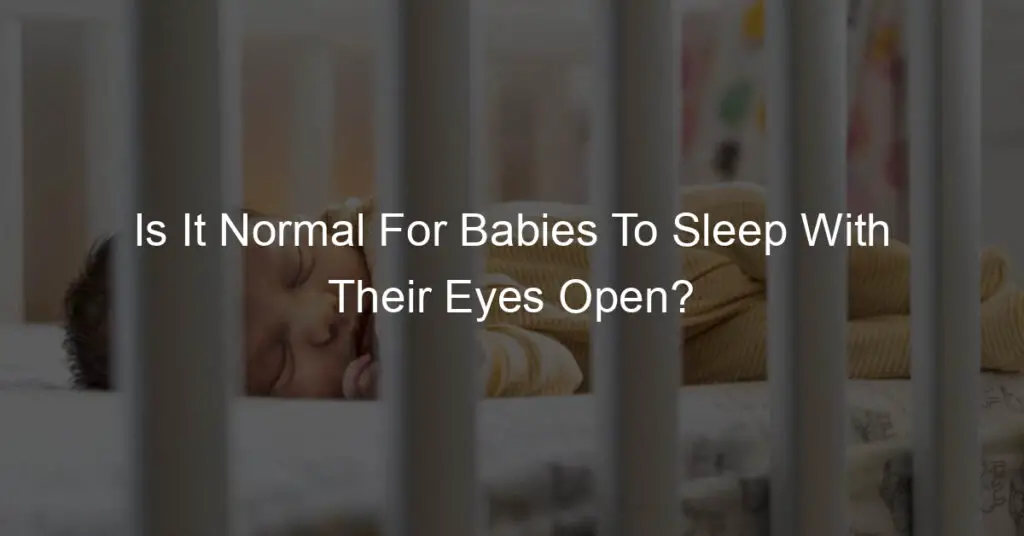Introduction to Infant Sleep Patterns
Understanding your baby’s sleep patterns can be a challenging task for new parents. Babies have different sleep habits compared to adults, and these can change as they grow. In this section, we will delve into the fascinating world of infant sleep, shedding light on newborn sleep habits, common baby sleep behaviors, and unusual baby sleep patterns.
-
- Understanding Newborn Sleep Habits
Newborns sleep a lot, typically between 16 and 17 hours a day. However, they don’t sleep for long stretches at a time. Most newborns sleep in 2 to 4-hour intervals, waking up frequently for feedings both day and night. Their sleep is also divided almost equally between light and deep sleep, which is why they can seem to wake up easily. Read more about newborn sleep habits on Wikipedia.
-
- Common Baby Sleep Behaviors
As babies grow, their sleep patterns start to change. By 3 to 6 months, many infants have a regular sleep-wake cycle and longer sleep times. Some common behaviors include “sleeping through the night”, waking up at night, and having three to four naps during the day. Babies also tend to have periods of REM sleep, characterized by rapid eye movements, fluttering eyelids, and body movements. Learn more about REM sleep on Wikipedia.
-
- Unusual Baby Sleep Patterns
While there are common sleep patterns, every baby is unique and may have their own unusual sleep habits. Some babies might sleep with their eyes partially open, while others may make noises or move a lot during sleep. It’s important to remember that what’s “normal” can vary widely from baby to baby. If you’re concerned about your baby’s sleep patterns, it’s always a good idea to consult with a pediatrician. Find out more about pediatrics on Wikipedia.
In the following sections, we will explore more about babies sleeping with their eyes open, the reasons behind this behavior, its impact on the baby’s health, and when to seek medical advice. We will also share some case studies and key takeaways to help you better understand your baby’s sleep.
Babies Sleeping with Eyes Open: An Overview

As a parent, you may have noticed your baby sleeping with their eyes open. This can be a startling sight, but it’s not uncommon. This article will delve into what it means when a baby’s eyes are open while sleeping, whether it’s normal, and the prevalence of this baby sleep issue.
-
- What it means when a baby’s eyes are open while sleeping
When a baby sleeps with their eyes open, it’s a condition known as nocturnal lagophthalmos. This term refers to the inability to close the eyelids completely during sleep. It’s more common in babies and young children, and most outgrow it as they develop.
-
- Is it normal for babies to sleep with eyes open?
While it may seem unusual, it’s not abnormal for babies to sleep with their eyes open. It’s a habit that some infants develop and usually isn’t a cause for concern. However, if you notice your baby’s eyes are dry, irritated, or they are having trouble sleeping, it’s worth discussing with your pediatrician.
-
- Prevalence of this baby sleep issue
According to a study published in the Journal of Pediatrics, about 20% of infants sleep with their eyes partially open at some point during their first year. So, if you’ve noticed this in your baby, know that you’re not alone.
In the following sections, we’ll explore the reasons why babies might sleep with their eyes open, the potential impact on their health, and when it might be necessary to seek medical advice.
Reasons Babies Sleep with Eyes Open
It may be surprising to see your baby sleeping with their eyes open. While it can seem unusual, it’s not uncommon and there are several reasons why this might happen. Here are some of the main reasons:
-
- Genetics and Family History
Just like other traits, the tendency to sleep with eyes open can be inherited. If you or your partner sleep with your eyes open, your baby might do the same. This is often harmless and usually decreases as the child grows older.
-
- REM Sleep Phase
During the Rapid Eye Movement (REM) phase of sleep, your baby’s eyes might move beneath their eyelids and sometimes the eyelids might open. This phase is when most dreaming occurs and it’s a crucial part of the sleep cycle. Learn more about REM sleep here.
-
- Infant Sleep Disorders
Some sleep disorders can cause a baby to sleep with their eyes open. These include conditions like sleep apnea, where breathing temporarily stops during sleep, or night terrors. If you suspect your baby has a sleep disorder, it’s important to seek medical advice.
-
- Other Health Conditions
Other health conditions, such as Bell’s palsy or Grave’s disease, can also cause a baby to sleep with their eyes open. These conditions are rare in infants, but if you notice any other unusual symptoms, it’s best to consult a healthcare professional.
Remember, every baby is unique and their sleep patterns can vary. It’s always best to consult with a healthcare professional if you have any concerns about your baby’s sleep habits.
Impact on Baby’s Health
Understanding the impact of certain behaviors on your baby’s health is crucial for their overall well-being. In this section, we will discuss the physical impacts of babies sleeping with their eyes open.
Physical Impact
While it may seem harmless, babies sleeping with their eyes open can have certain physical impacts. Let’s delve deeper into these concerns.
-
- Eye health concerns
When a baby sleeps with their eyes open, it could lead to dryness and irritation as the eyes are not getting the necessary rest and lubrication. This condition, known as nocturnal lagophthalmos, can potentially lead to more serious eye health issues if not addressed promptly.
-
- Potential for sleep disruptions
Another physical impact is the potential for sleep disruptions. Babies who sleep with their eyes open might be more prone to waking up due to light or movement in their field of vision. This can lead to fragmented sleep, which is not ideal for their growth and development.
It’s important to monitor your baby’s sleep habits and consult with a healthcare professional if you notice anything unusual. Remember, your baby’s health is paramount, and understanding the potential impacts of their sleep behaviors can help ensure they grow and develop optimally.
Mental Impact
Just as the physical health of your baby is important, so is their mental well-being. The way your baby sleeps can have a significant impact on their mental health. This includes their sleep quality and cognitive development. Let’s delve deeper into these aspects.
-
- Effect on Sleep Quality
When babies sleep with their eyes open, it might affect the quality of their sleep. This is because the brain may not fully switch to the ‘sleep mode’. It might still be processing visual information, leading to disturbed sleep. A study by the American Academy of Pediatrics suggests that good quality sleep is essential for a baby’s mental health and emotional regulation.
-
- Impact on Cognitive Development
Quality sleep is crucial for cognitive development in babies. It aids in memory consolidation and brain maturation. However, if a baby sleeps with their eyes open, their sleep might be fragmented, leading to less effective cognitive development. According to a child development study, there is a strong correlation between quality sleep and cognitive abilities like problem-solving, attention, and memory.
In conclusion, the mental impact of babies sleeping with their eyes open can be significant. It’s important to ensure that your baby is getting good quality sleep for their overall mental well-being and cognitive development.
When to Seek Medical Advice

While it’s normal for babies to occasionally sleep with their eyes open, there are certain situations when you should seek medical advice. Here are some key indicators that it might be time to consult a healthcare professional:
-
- Signs of Infant Sleep Disorders
If your baby frequently sleeps with their eyes open, it could be a sign of a sleep disorder. Other symptoms to look out for include excessive sleepiness during the day, difficulty falling asleep, or frequent waking during the night. According to a Wikipedia article on sleep disorders, these could be signs of conditions like sleep apnea or insomnia.
-
- When the Behavior Persists Beyond Infancy
Most babies outgrow the habit of sleeping with their eyes open as they develop. If your child continues to do this beyond their first year, it may be a good idea to seek medical advice. Persistent sleep issues can sometimes be a sign of underlying neurological or developmental issues.
2. If Associated with Other Concerning Symptoms
If your baby’s open-eyed sleeping is accompanied by other concerning symptoms such as fever, unusual breathing patterns, or changes in eating habits, it’s important to consult a healthcare professional. These could be signs of a more serious health issue that needs immediate attention.
In conclusion, while it’s not uncommon for babies to sleep with their eyes open, it’s important to stay vigilant for any signs of potential health issues. Always consult a healthcare professional if you have any concerns about your baby’s sleep patterns.
Case Studies: Babies Sleeping with Eyes Open
Let’s delve into real-life examples to better understand this phenomenon. We’ll look at two case studies, Baby Jane and Baby John, who were observed sleeping with their eyes open.
- Case Study 1: Baby Jane
Baby Jane, a six-month-old, was often found sleeping with her eyes partially open. Her parents, initially alarmed, sought advice from their pediatrician. The doctor reassured them that this was a common occurrence in infants and was due to immature neurological development. Jane’s parents were advised to gently close her eyes if they remained open for more than a few minutes. Over time, as Jane grew older, she outgrew this habit.
- Case Study 2: Baby John
Baby John, a three-month-old, had a similar experience. His parents noticed that he would often sleep with his eyes open, especially during naps. They consulted their pediatrician who explained that this was a normal part of infant sleep patterns, often linked to REM sleep. John’s parents were advised to monitor his sleep and ensure he was getting enough rest. As with Jane, John’s habit of sleeping with his eyes open diminished as he grew older.
These case studies illustrate that sleeping with eyes open is a common occurrence in babies and usually not a cause for concern. However, if you notice any unusual behavior or symptoms, it’s always best to consult with your pediatrician.
Remember, every baby is unique and their sleep patterns can vary. Understanding your baby’s sleep habits can help you better care for them and ensure they are getting the rest they need.
Key Takeaways: Understanding Your Baby’s Sleep
As we conclude our discussion on infant sleep patterns, particularly the phenomenon of babies sleeping with their eyes open, it’s important to summarize the key points. This will help you as a parent to better understand your baby’s sleep and know when to seek help.
- Recognizing normal and unusual sleep patterns: Normal sleep patterns for babies can vary greatly. Newborns sleep for about 16-18 hours a day, often in 3-4 hour intervals. As they grow, the total sleep time decreases and they start sleeping for longer periods at a stretch. It’s also normal for babies to move, twitch, or even open their eyes during sleep. However, if your baby consistently sleeps with their eyes open, it could be a sign of a condition called nocturnal lagophthalmos. Learn more about this condition on Wikipedia.
- Understanding when to seek help: While it’s not uncommon for babies to sleep with their eyes open occasionally, consistent occurrence of this behavior warrants medical attention. Other signs that you should seek help include if your baby is having trouble breathing during sleep, if they are not gaining weight, or if they are excessively sleepy or difficult to wake up.
- Ensuring your baby’s healthy sleep habits: To promote healthy sleep habits, establish a consistent bedtime routine, create a sleep-friendly environment, and ensure your baby is getting enough to eat during the day. Avoid overstimulation before bedtime and try to put your baby to bed when they are sleepy but still awake. This helps them associate the bed with the process of falling asleep.
In conclusion, understanding your baby’s sleep is crucial for their health and development. While it can be challenging to decipher their sleep patterns, keeping these key takeaways in mind can guide you in the right direction. Remember, when in doubt, always consult a healthcare professional.














